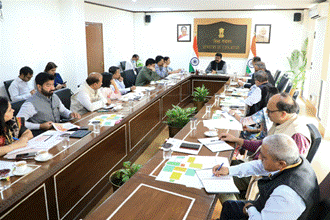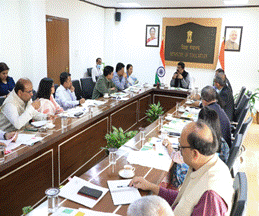
Union Minister for Education and Skill Development & Entrepreneurship Shri Dharmendra Pradhan today chaired a high-level meeting on the preparations for the upcoming G20 Summit to be held in India in 2023. MoS for Skill Development and MEITY, Shri Rajeev Chandrasekhar; MoS for Education, Smt Annapurna Devi, MoS Rajkumar Ranjan Singh and senior officials of the Education and Skill Development Ministry attended in the meeting.


During the meeting, Shri Pradhan said that education is one of the priority areas in G20. He called for extensive preparations ahead of the G20 meet and said that the G20 meet under India’s presidency is also an opportunity to share what India has achieved in the education sector particularly after the launch of National Education Policy 2020. He also said that India will present a new template of education which can be a global model for all emerging economies. He also called for involving students, educational and skilling institutions to make the summit a grand success. The Minister also suggested showcasing the rich heritage of Indian Knowledge Systems and making participants aware of the contribution of India to the world.
The Education Working Group will be holding seminars on the role of digital technology in education and TVET and future of work leading to meeting of G20 education ministers on 28 June 2023. The education working group will come out with a G 20 EdWG report, compendium of best practices and a report on the two seminar themes leading to G20 Education Ministers’ declaration. Institutions like NCERT, IISC, NSDC, IIT Madras, IIT Hyderabad, Ministry of Skill Development & Entrepreneurship, UNESCO, UNICEF, OECD, etc are knowledge partners under various priority areas.
It is to be noted that India is going to assume G20 presidency from 1st December 2022 and the events will be held in across the country. The four priority areas under education are:
1. Ensuring foundational literacy and numeracy especially in context of blended learning.
2. Building capacities promoting lifelong learning in context of future of work
3. Making tech enabled learning more inclusive, qualitative and collaborative at every level and
4. Strengthening research, promoting innovation through richer collaboration.
****
MJPS/AK

